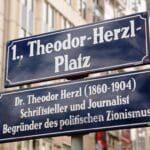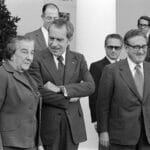„This article demonstrates that an Arab war against the United Nations’ decision in favor of the partition of Mandatory Palestine was not inevitable. It deals with the after-effects of Nazi anti-Zionist propaganda in the Arab world and the antisemitic campaign of the Mufti of Jerusalem, Hajj Amin el-Husseini, who was supported by the Muslim Brotherhood.
Even though the Arab world rejected the Partition Plan, there was at the same time a general reluctance to go to war, not only among the Arabs in Palestine but also among the governments of major Arab League states such as Egypt. It was the mobilization of the Muslim Brotherhood that caused the Arab League to embrace the Mufti, a Nazi-collaborator and war criminal, as leader of the Palestinian Arabs. By staging destabilizing mass demonstrations and a murderous campaign of intimidation, Hajj Amin el-Husseini and the Muslim Brotherhood dragged Egypt and other Arab states into a full-scale war against the Jews of Mandatory Palestine. The inability of key Arab actors to stand their ground, combined with the cowardice of the Western powers who tacitly anticipated a Jewish defeat, paved the way for one of the most fateful turning points in twentieth-century history, one that has shaped the Middle East conflict to the present.“ (Der Mena Watch-Gastautor Matthias Küntzel in einem Artikel für das Jerusalem Center for Public Affairs: „The Aftershock of the Nazi War against the Jews, 1947–48: Could War in the Middle East Have Been Prevented?“)
Matthias Küntzel exklusiv für Mena Watch:
Vor 80 Jahren: Arabischer Aufstand in Palästina
Flüchtlingskrise: Biedermann Steinmeier als Brandstifter






